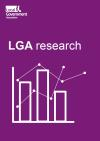This research report presents the findings from two surveys of council chief executives conducted by the LGA in early 2024.
Background
In January 2024, the Local Government Association (LGA) sent an online survey to the chief executives of all member councils in England. The purpose of the survey was to understand the decisions that councils were making to balance their budgets for the next financial year, and how these decisions might impact the services that councils provide to residents. A total of 96 chief executives responded – a response rate of 30 per cent.
On 24 January 2024, the government announced an allocation of £600 million in additional funding for councils for financial year 2024/25.
Following this announcement, in February 2024, the LGA sent a second online survey to the chief executives of all member councils in England. The purpose of this follow-up survey was to assess what impact, if any, this funding had had, and what challenges, if any, still remained. A total of 102 chief executives responded – a response rate of 32 per cent.
Despite the additional funding, the results from the second survey demonstrated that the majority (85 per cent) of respondent councils still anticipated having to make cost savings to set their budgets; therefore, although the first survey was conducted before this announcement, the findings still offer a valid insight into the decisions that councils are having to make in order to set a balanced budget for 2024/25.
Key findings from the first survey
- Three quarters (74 per cent) of respondents reported that they found it very or fairly difficult to set a balanced budget for the upcoming financial year, and 71 per cent expected to use their reserves.
- Prior to the additional funding announcement, over four in five (81 per cent of) county and single tier respondents, and almost three in five (58 per cent of) district councils reported that it was very or fairly likely that at least one neighbourhood service would be negatively impacted by cost savings.
- Three in five respondents (59 per cent) reported that their ability to help relieve pressure on the NHS would be impacted to a great or moderate extent. This figure was 83 per cent among county and single tier councils.
- Given the opportunity to provide any further comments about their budget, more than half of all comments expressed worry and concern about balancing their budget in the medium term: that is, in the financial year 2025/26 and beyond.
Key findings from the second survey, after the funding announcement
- A large majority of respondents (85 per cent) reported they would still have to make cost savings to balance their 2024/25 budget after the announcement on 24 January of an additional £600 million in funding.
- Three-fifths of respondents (58 per cent) reported that this additional funding was helpful to a small extent.
- Respondents were nonetheless supportive of the work undertaken to secure this funding, as 99 per cent of councils responding to the second survey reported that they supported the lobbying work of the LGA, County Councils Network (CCN) and District Councils Network (DCN).
- Two-thirds (67 per cent) of respondents anticipated making cost savings in at least one neighbourhood service1, despite the additional funding: more than three-quarters (77 per cent) of social care councils reported this, as well as three in five district councils (59 per cent).
- Of the respondent social care councils, three-quarters (75 per cent) reported that even with this funding, cost savings would be needed in their adult social care budget, and almost seven in 10 (69 per cent) reported that savings would be needed in their children’s social care budget.
- Half (50 per cent) of all respondent social care councils reported that cost savings would be needed in four or more neighbourhood services.
- Of the respondent councils with responsibility for the following services, and despite the additional funding:
- More than half (55 per cent) reported that cost savings would be needed in their sport and leisure service provision.
- Around half (48 per cent) reported that cost savings would be needed within their library services.
- Around half (48 per cent) reported that cost savings would be needed in their parks and green spaces service provision.
- Over a third (34 per cent) reported the need for cost savings in their provision of museums, galleries, and theatres.
- Given the opportunity to provide any further comments about their budget, many respondents expressed that the additional funding had minimal impact on the challenges they faced in balancing their budget for 2024/25. As with the first survey, some respondents in the second survey also expressed worry and concern about balancing their budget in the medium-to-long term.
For the purposes of these surveys, we defined ‘neighbourhood services’ as waste services, road and pavement repairs, sport and leisure services, parks and green spaces, library services, museums, galleries, and theatres, and regulatory services.

